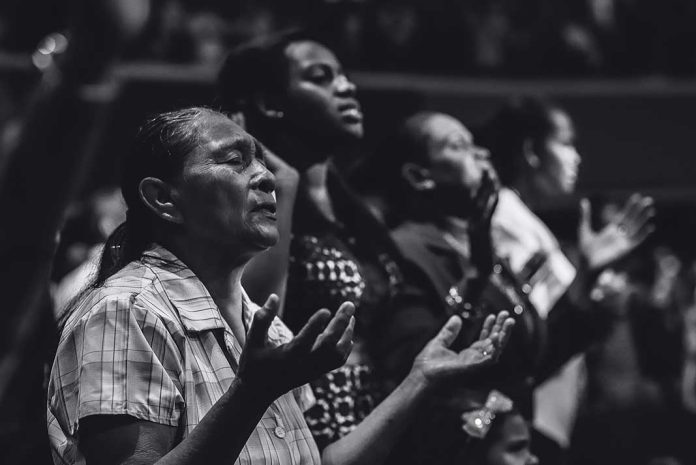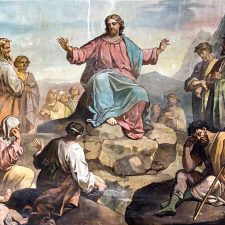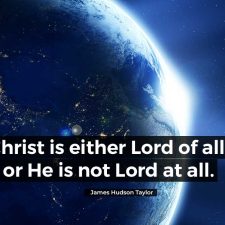In Exodus 19:10-11, the Lord said to Moses, “Go to the people and consecrate them today and tomorrow and let them wash their garments; and let them be ready for the third day, for on the third day the Lord will come down on Mount Sinai in the sight of all the people. The Hebrew word for consecrate is qadash and it means to set apart as holy. Yahweh wanted the people to be prepared for the perfect justice of God as represented by His Law by setting themselves apart. This would allow them to draw near with a true heart in full assurance of faith, having our hearts sprinkled from an evil conscience and our bodies washed with pure water (Hebrews 10:22). It means the believer can approach the Lord on His terms.
“Cry loudly, do not hold back; raise your voice like a trumpet, and declare to My people their transgression and to the house of Jacob their sins. “Yet they seek Me day by day and delight to know My ways, as a nation that has done righteousness and has not forsaken the ordinance of their God. They ask Me for just decisions, they delight in the nearness of God. ‘Why have we fasted, and You do not see? Why have we humbled ourselves [anah – denied ourselves] and You do not notice?’ Behold, on the day of your fast you find your desire and drive hard all your workers. “Behold, you fast for contention and strife and to strike with a wicked fist. You do not fast like you do today to make your voice heard on high. “Is it a fast like this which I choose, a day for a man to humble [anah – deny] himself? Is it for bowing one’s head like a reed and for spreading out sackcloth and ashes as a bed? Will you call this a fast, even an acceptable day to the Lord? “Is this not the fast which I choose, to loosen the bonds of wickedness, to undo the bands of the yoke [motah – forces that oppress God’s people], and to let the oppressed go free and break every yoke? “Is it not to divide your bread with the hungry and bring the homeless poor into the house; when you see the naked, to cover him; and not to hide yourself from your own flesh? “Then your light will break out like the dawn, and your recovery will speedily spring forth; and your righteousness will go before you; the glory of the Lord will be your rear guard. “Then you will call [qara – summon], and the Lord will answer; you will cry, and He will say, ‘Here I am.’ If you remove the yoke from your midst, the pointing of the finger and speaking wickedness, And if you give yourself to the hungry and satisfy the desire of the afflicted, then your light will rise in darkness and your gloom will become like midday. “And the Lord will continually guide you, and satisfy your desire in scorched places, and give strength to your bones; and you will be like a watered garden, and like a spring of water whose waters do not fail. “Those from among you will rebuild the ancient ruins; you will raise up the age-old foundations; and you will be called the repairer of the breach, the restorer of the streets in which to dwell. (Isaiah 58:1-12)
The Truth About Fasting
Isaiah 58 addresses the principle of fasting (Hebrew sum, to “cover” the mouth; Greek nesteuo, to “abstain”) and the lamentation of the people that they were faithful in fasting and other religious duties and God was not acknowledging or responding to their cries. It is interesting to note that fasting was not a religious requirement of the Law of Moses but introduced after the return from captivity. The only reference to the principle from Mt. Sinai is found in Leviticus 23:27 in relation to the Day of Atonement when it says you shall humble your souls [anah – deny yourselves] and present an offering by fire to the Lord. This word is repeated in the above passage as the people boast of their religious works and self-denial so that the Lord will answer their petitions. In the process, the Lord was exposing their unrighteousness, as verse 4 highlights, you fast for contention and strife and to strike with a wicked fist. God was revealing to them that their religious activities would be worthless apart from an interest in caring for others. James 1:27 says it this way, Pure and undefiled religion in the sight of our God and Father is this: to visit orphans and widows in their distress, and to keep oneself unstained by the world.
This principle was communicated to the people by other prophets, as well. In Micah 6:6-8,
With what shall I come to the Lord and bow myself before the God on high? Shall I come to Him with burnt offerings, with yearling calves? Does the Lord take delight in thousands of rams, in ten thousand rivers of oil? Shall I present my firstborn for my rebellious acts, the fruit of my body for the sin of my soul? He has told you, O man, what is good; and what does the Lord require of you but to do justice [bring justice to those who have experienced injustice], to love kindness, and to walk humbly with your God?
Weightier Provisions
These verses tell us that religious activity is no substitute for the believer’s interest in caring for others’ needs and having a walk before God, with humility. Jesus exposed this same issue to the scribes and Pharisees in Matthew 23:23 when He said, “Woe to you, scribes and Pharisees, hypocrites! For you tithe mint and dill and cummin and have neglected the weightier provisions of the law: justice and mercy and faithfulness; but these are the things you should have done without neglecting the others.” The prophet Isaiah highlighted the matter in Isaiah 29:13 when the Lord said, “Because this people draw near with their words and honor Me with their lip service, but they remove their hearts far from Me, and their reverence for Me consists of tradition learned by rote.” The issues that separate the believer from His God are always a matter of the heart.
So much of church activity today is preoccupied with religious activities (i.e., fasting) and other programs that are intended to bring the believer closer to God, but Scripture says it will not produce the expected results apart from a full heart commitment, a consecrated life. Isaiah 58:6, above, addresses the principle of yokes that bind the people into wickedness, forces that oppress God’s people. The solution is found in Verse 7, dividing your bread with the hungry and inviting the homeless into the house, etc. The promise is that your righteousness will go before you; the glory of the Lord will be your rear guard (Verse 8). As a result, the Lord will say, Here I am.
Belonging to the Lord
The consecrated life recognizes that he is no longer his own, he was bought with a price (1 Corinthians 6:19-20) and that his life now belongs to the Lord. It means that he is available to be used by God for any purpose, especially when others’ needs become apparent. Isaiah characterizes this life in relation to the Jew’s attitude toward the Sabbath in Isaiah 58:13-14,
“If because of the sabbath, you turn your foot from doing your own pleasure on My holy day, and call the sabbath a delight, the holy day of the Lord honorable, and honor it, desisting from your own ways, from seeking your own pleasure and speaking your own word, Then you will take delight in the Lord, and I will make you ride on the heights of the earth; and I will feed you with the heritage of Jacob your father, for the mouth of the Lord has spoken.”
When we treat each day as the Jews recognize the Sabbath, as holy unto the Lord, we embrace the consecrated life. The governing attitude is the turning of the foot (i.e., walk) from doing one’s own pleasures, desisting from your own ways, from seeking your own pleasure. According to Exodus 31:13, when the Jew honors the Lord by observing the Sabbath, the Lord is sanctifying him, making him ride on the heights of the earth. This means that when he gives himself to the hungry and satisfy the desire of the afflicted, then your light will rise in darkness and your gloom will become like midday (Isaiah 58:10). It reminds me of a quote by a famous Jewish Rabbi:
Rabbi Abraham Isaac Kook, the first Chief Rabbi of Israel and one of the most influential rabbis of the 20th century. Rabbi Kook wrote, “Every person is required to know that there is a candle burning inside of him, and his light isn’t like anyone else’s light, and there is no one who doesn’t possess a light. Every single person is required to understand that it is his obligation to work on revealing his light, and to make it into a great torch, shedding light on the whole world.”
A Watered Garden
The Lord also promised that a consecrated life is one that receives His guidance and is satisfied in scorched places; and you will be like a watered garden, and like a spring of water whose waters do not fail (Isaiah 58:12). Jeremiah 17:7-8 tells us that the one who trusts in the Lord, whose trust is the Lord, “For he will be like a tree planted by the water, that extends its roots by a stream and will not fear when the heat comes; but its leaves will be green, and it will not be anxious in a year of drought nor cease to yield fruit.” The consecrated life is an acknowledgment of the Lord’s commitment to the believer and is evidenced by fruitfulness and a life filled with His riches.
34 “Then the King will say to those on His right, ‘Come, you who are blessed of My Father, inherit the kingdom prepared for you from the foundation of the world. 35 For I was hungry, and you gave Me something to eat; I was thirsty, and you gave Me something to drink; I was a stranger, and you invited Me in; 36 naked, and you clothed Me; I was sick, and you visited Me; I was in prison, and you came to Me.’ 37 Then the righteous will answer Him, ‘Lord, when did we see You hungry, and feed You, or thirsty, and give You something to drink? 38 And when did we see You a stranger, and invite You in, or naked, and clothe You? 39 When did we see You sick, or in prison, and come to You?’ 40 The King will answer and say to them, ‘Truly I say to you, to the extent that you did it to one of these brothers of Mine, even the least of them, you did it to Me.’ (Matthew 25:34-40)













